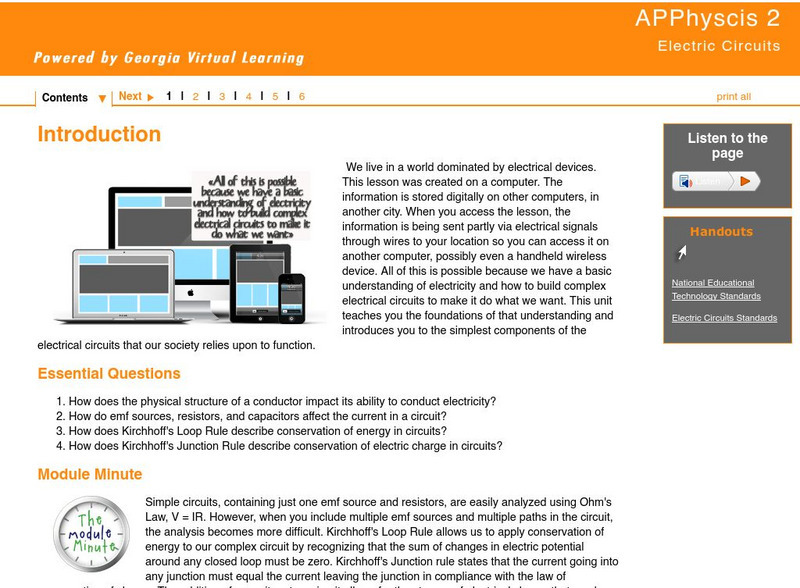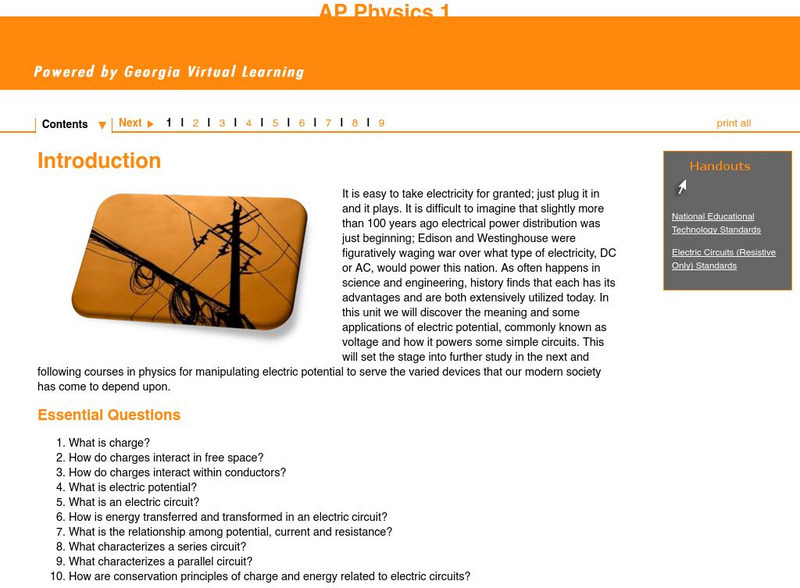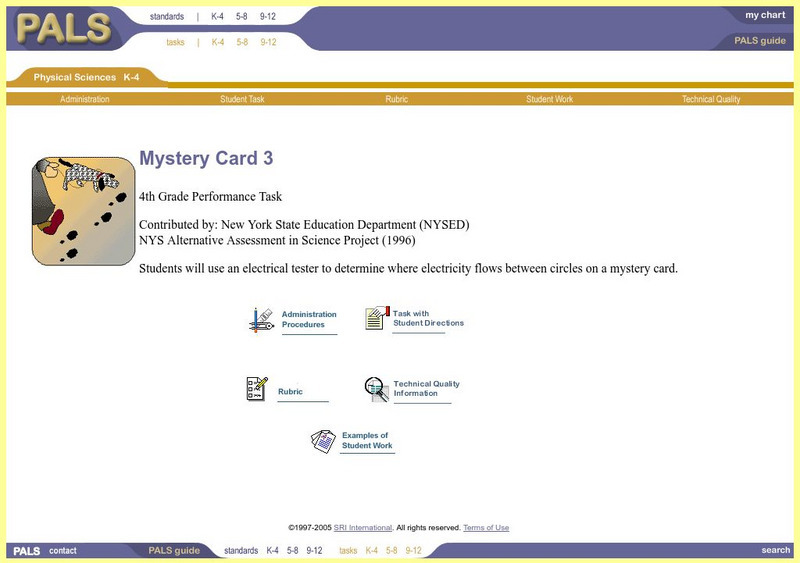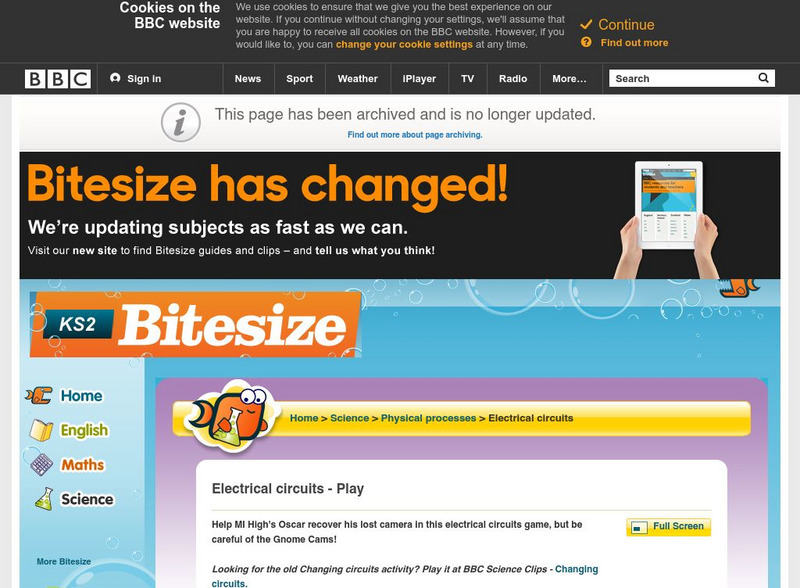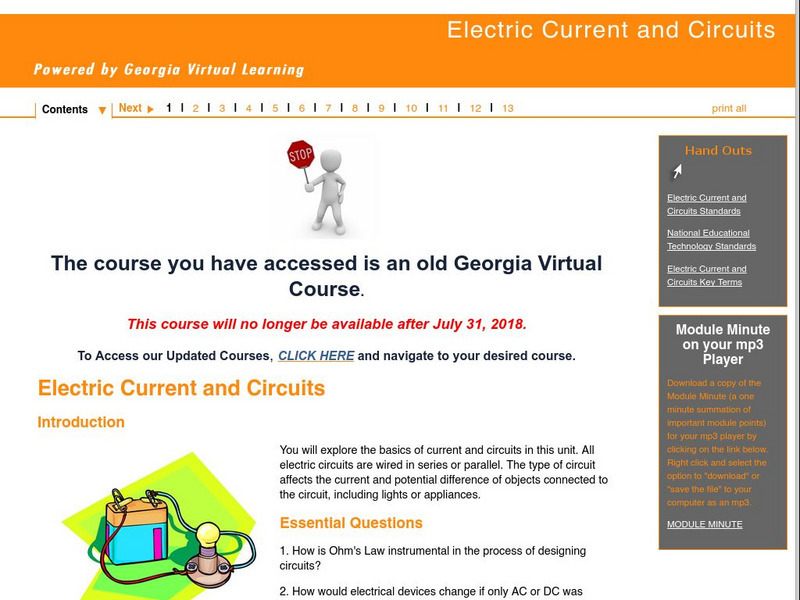CK-12 Foundation
Ck 12: Physical Science: Electric Circuits
[Free Registration/Login may be required to access all resource tools.] Explains what an electric circuit is, its different parts, and how to represent it using a circuit diagram.
CK-12 Foundation
Ck 12: Fourth Grade Science: Physical Science: Electric Circuits
[Free Registration/Login may be required to access all resource tools.] Describes the parts of an electric circuit and identifies electric safety features and how to use electricity safely.
Other
The Blobz Guide to Electric Circuits
An exciting interactive site of games, activities, information, and quizzes about electric circuits. You'll learn what makes circuits work, all about conductors and insulators, switches, changing circuits, and circuit diagrams. Learning...
E-learning for Kids
E Learning for Kids: Science: Vikings: What Is an Electric Circuit?
The god of thunder, Thor, controls thunder and lightning. Let's ask Thor about electric circuits.
Georgia Department of Education
Ga Virtual Learning: Ap Physics 2: Electric Circuits
This unit teaches students the foundations of electrical circuits and introduces them to their simplest components. Covers series and parallel circuits, Kirchhoff's Rules, Ohm's Law, RC circuits, resistivity, and capacitance.
American Association of Physics Teachers
Com Padre Digital Library: Open Source Physics: Chaotic Electric Circuit Explorer
Simulation investigating the characteristics of two electrical circuits that exhibit chaotic behavior, Chua's circuit and an autonomous relaxation oscillator (ARO), by adjusting the settings.
Georgia Department of Education
Ga Virtual Learning: Ap Physics 1: Electric Circuits
In this unit students discover the meaning and some applications of electric potential, commonly known as voltage, and how it powers some simple circuits.
Concord Consortium
Concord Consortium: Stem Resources: Electric Current
In this interactive, students can explore how current, voltage, and resistance are related in a model showing the flow of electrons in an electric circuit. They will learn about Ohm's law and how other forms of energy can be made from...
Massachusetts Institute of Technology
Mit: Open Course Ware: Courses: Electrical Engineering: Circuits and Electronics
College-level electrical engineering course highlighting circuits and electronics. This course introduces the fundamentals of the lumped circuit abstraction. Course features include video lectures, suggested readings, labs, lecture...
Museum of Science
Museum of Science and Industry: Online Science: Make a Circuit Board
Step-by-step illustrated instructions showing how to build a circuit board using everyday materials.
SRI International
Performance Assessment Links in Science: Mystery Card 3
Straightforward introduction to electrical circuits using minimal materials and time. Students learn about the basics of electrical circuits by experimenting with "mystery cards" -- index cards with hidden aluminum foil used to conduct...
American Geosciences Institute
American Geosciences Institute: Earth Science Week: Mineral Electrical Conductivity
The purpose of this activity is to test the conductivity of various minerals with a simple electrical circuit and draw conclusions about which ones would be used in electronics.
Canada Science and Technology Museum
Canada Science and Technology Museum: Background Information for Electricity
The Canada Science and Technology Museum answers some of the most common questions about electricity. For example, get the definition of electricity, the difference between alternating and direct currents, and learn how a fuse works.
BBC
Bbc Schools: Ks2 Bitesize: Science: Physical Processes: Electrical Conductors
Find out which material will save Steve from getting shocked by the electric eels. Following the activity, read more about electrical conductors, and then take a quick quiz to check for understanding.
CK-12 Foundation
Ck 12: Physical Science: Electric Safety
[Free Registration/Login may be required to access all resource tools.] Overview of electric safety: short circuits, electric safety features, and how to use electricity safely.
BBC
Bb Ci Schools: Revisewise Science Electricity
This lesson provides an interactive activity on electrical circuits along with a information sheet and a practice test.
Georgia Department of Education
Ga Virtual Learning: Electric Current and Circuits
Students have the opportunity to explore the basics of current and circuits in this online module. Some of the activities include interactive animations, informational text, practice problems, and lab experiments.
Science Buddies
Science Buddies: Dance Mania: Build Your Own Dance Pad!
The objective of this electricity and electronics science fair project is to build a dance pad that flashes lights when you step on it.
Read Works
Read Works: Electricity & Energy Circuits
[Free Registration/Login Required] An informational text about electric circuits. A question sheet is available to help students build skills in reading comprehension.
Ducksters
Ducksters: Kids Science Projects and Experiments: Electric Circuit
Kids learn by experimenting with science. Project on building an electronic circuit.
Ducksters
Ducksters: Kids Science: Electricity 101
Kid's learn about the basic science of electricity. What is it and how it works.
Science Buddies
Science Buddies: Which Materials Are the Best Conductors?
There are two main types of materials when it comes to electricity, conductors, and insulators. What are they made of? Find out by testing different materials in a circuit to see which ones conduct the most electricity.
Science Buddies
Science Buddies: Project Ideas: Which Materials Are the Best Conductors?
A simple science fair project to test whether electricity can flow between two things. The Science Buddies project ideas are set up consistently beginning with an abstract, objective, and introduction, followed by a section on terms,...
Science Buddies
Science Buddies: Solar Cell Power Output vs. Temperature
Solar cells provide a clean way of making electricity directly from sunlight. In this project you will build a simple circuit and experimental setup to investigate whether the power output of a solar cell changes with ambient temperature.




